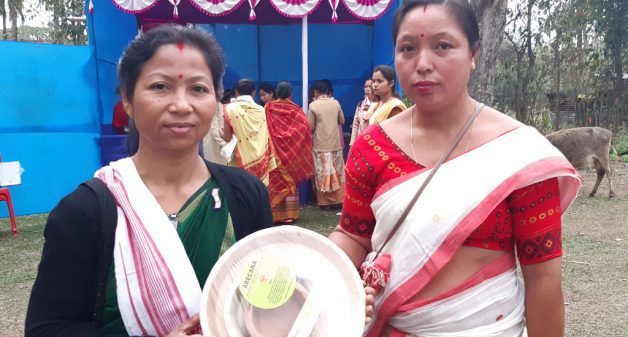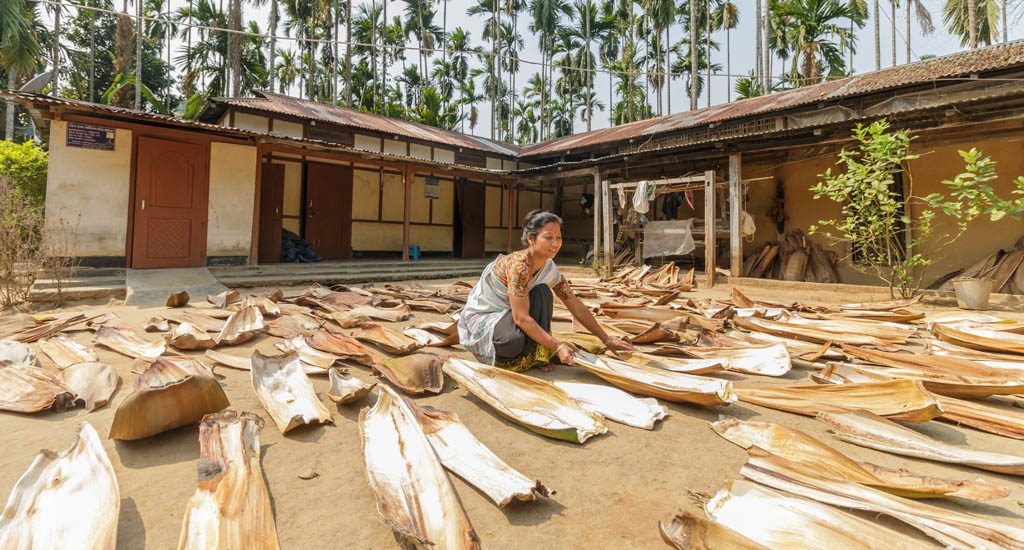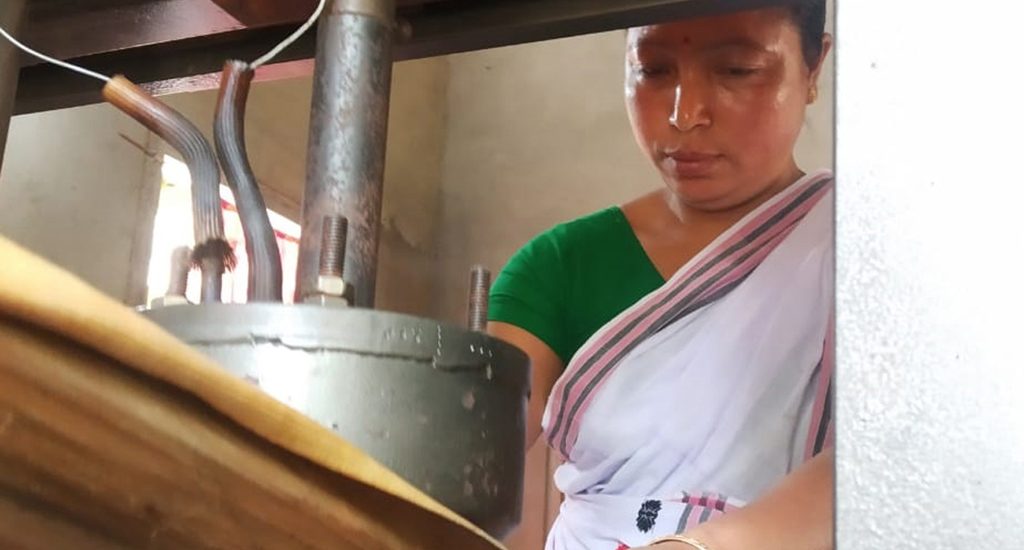
Women bring economic and environmental changes with leaf plates
By making biodegradable tableware from areca leaves that used to be burnt, rural women in Assam help minimize air and plastic pollution, while increasing their household income

By making biodegradable tableware from areca leaves that used to be burnt, rural women in Assam help minimize air and plastic pollution, while increasing their household income
Rijumoni Rabha of Baghmara village in Assam’s Kamrup district always worried about money for daily expenses as her husband does not have a regular income. But now that she makes tableware from areca nut leaves, she is able to contribute to the family income.
Rural women are able to complement their household income by tapping into an abundantly available natural resource. The women are making biodegradable plates from areca nut tree leaves, which previously went to waste.
Rijumoni Rabha’s husband is a landless farmer. “He works in others’ lands for wages and so the income is not regular,” she told VillageSquare.in. “Earlier I would go to other places for part time works, but that income was also not sufficient.”
She finds leaf plate making a great experience that also increases her income. “I have learnt a new craft and I’m confident that it can further enhance my earnings,” said 37-year old Rijumoni Rabha. Around 35 women in Bamunigaon, Baghmara and other villages in Chhaygaon area making areca nut leaf plates.
Funded by InterGlobe Foundation and implemented by Dhriiti, Project Pragati has women making areca nut leaf plates that are 100% biodegradable. The home-based microenterprises have been functioning for the last two years.
InterGlobe Foundation has funded the machines. The machines have been installed in the women’s houses. Assam-based Tamul Plates Marketing Private Limited has provided technical and marketing support. Dhriiti selected the women after conducting training in the villages.

“We chose the region because of the availability of raw materials,” said Nidhi Arora, executive director of Dhriiti “After awareness camps, we informed the women about the assistance.” The women invested around Rs 20,000 to make necessary arrangements at home so that the machine worth Rs 3 lakh could be fixed.
Earlier the areca nut tree leaves were either burnt to ashes or were thrown away. Now the villagers have become aware of the economic value of the leaves. They have also realized the ill-effects of plastic usage and the importance of biodegradable products.
InterGlobe Foundation aims not only to create women entrepreneurs who would make tableware out of areca nut tree leaves and make a living, but also to produce eco-friendly plates which would replace plastics or other polluting materials.
“I have been making plates and spoons from areca nut leaves for the last two years,” Rita Rabha of Batakuchi village and one of the village entrepreneurs told VillageSquare.in. “Earlier, these were wasted but now we are making money from the wastage.”
Initially Rijumoni Rabha earned around Rs 5,000 making the plates and now it has increased to Rs 10,000 a month. “If I spend more time on it, I’m confident that I can earn up to Rs 20,000 easily. Now, even my children and husband are helping me out,” she added.
Rita Rabha, a matriculate, said that single-handedly she can make up to 300 plates in a day. The women find that there is a scope to earn more. “We see a better future for the village women if we can stick to this job since people don’t want to use plastic items nowadays,” said Rita Rabha.

“Through this project we were able to empower 35 women to make a living by making these eco-friendly cutleries and the benefits reach more than 300 others,” Priyanka Singh, head of InterGlobe Foundation told VillageSquare.in. “They all are very happy that their incomes have gone up.”
Dhriiti helps the women manage their enterprise, create a network of raw material suppliers and learn accounting. It guides the women how to balance their household responsibilities and all the activities that go into plate-making work.
Dhriiti helps in developing leadership quality among the women who would actually run the project. “They need to mobilize the community, get the raw materials, pack the finished products, and do other related activities,” Nidhi Arora told VillageSquare.in.
With the training, the women are able to manage the bank works. “Their confidence has increased. They feel that the community has more respect for them,” said Priyanka Singh. They are happy that their home-based enterprises contribute their mite in fighting climate change with an eco-friendly product.
Abdul Gani is a journalist based in Guwahati. Views are personal.